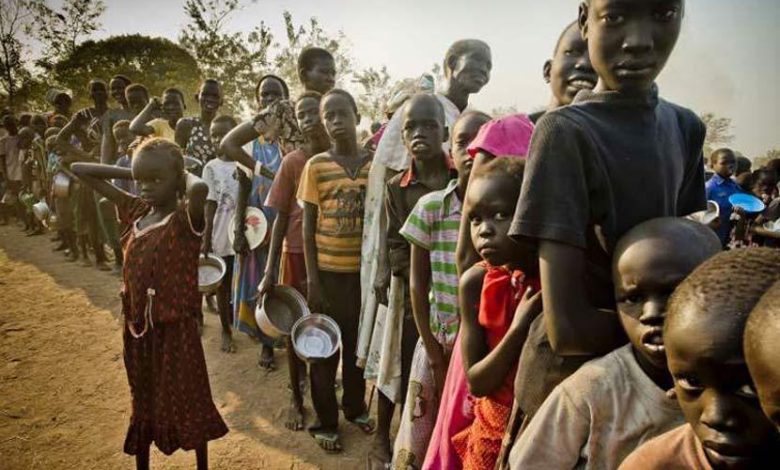The Sudanese are facing hunger after the halt of their salaries
Sudanese Facing Hunger as Their Salaries Stop... UN Official: Most Brutal Wars Revealed

A report has revealed the catastrophic conditions faced by employees in Sudan since the start of the war, indicating that they are now facing hunger due to the halt of their salaries.
Statistics indicate that the number of employees who have not received their salaries so far amounts to one million employees. Among them are more than 300,000 male and female teachers in the government education sector who were receiving meager salaries, according to Ammar Yousif, head of the Teachers’ Committee, as reported by the French news agency.
Catastrophic conditions
Yousif stated, “Teachers in Sudan, in both the public and private sectors, are living in dire conditions amidst the ongoing war alongside the daily suffering they endure from violations.”
He continued, “They were already suffering from low salaries, and some of them were forced to stay in combat zones,” referring to the inability to afford travel costs, whether domestic or international, due to a twenty-fold increase in fuel prices since the start of the war.
Only One Meal
Imad Mohammed, a teacher in a Sudanese government school, worked for 32 years when the war broke out three months ago, tearing apart his country and his finances.
He told France Presse about his family of five, “We now only have one meal.”
The teacher from Al Jazirah State survived the brutal fighting but still suffers from severe deprivation, saying, “We don’t know how long this will continue?”
Living on Aid
After being deprived of their salaries and annual leave allowances during the Eid al-Fitr in April and Eid al-Adha in June, approximately one million desperate public sector workers had to rely on their savings or social assistance networks.
Ammar Yousif, head of the Sudanese Teachers’ Committee, stated, “Teachers and their families in both the public and private sectors are going through a catastrophic situation.”
No Escape from Hunger
More than 1.5 million people fled from Khartoum alone, using whatever money they had when the fighting began, escaping airstrikes, artillery fire, and street battles that turned the capital into a war zone. However, those who were less fortunate had little to no savings or access to any savings, leaving them stranded and unable to afford the high transportation costs as fuel prices have increased twenty-fold.
Yousif told France Presse, “They are not only struggling to feed their families once a day, but they also cannot afford to transport their families to safety away from the combat zones.”
He said, “Government education alone employs over 300,000 people who were already receiving low salaries before the war,” adding that the Ministry of Education has been inaccessible since the start of the war.
He further added, “Those who didn’t die from bullets will die of hunger.”
With rising food prices, depleted essential supplies, and halted salaries, more than half of the country’s 48 million population requires assistance, according to the United Nations.
Sudan is classified as one of the highest areas of concern for food insecurity, warning of the need for “urgent” action from the international community.
Reassurance Conferences
Since the start of the war, few government officials have held press conferences in an attempt to reassure the public that the economy is not in danger, including Finance Minister Jibril Ibrahim.
The Central Bank announced in early July that branches in most Sudanese states had resumed services, raising some hopes.
However, according to economist Mohamed Al-Nair, “The situation will worsen in the coming months; even before the war, the Sudanese economy was suffering from three-digit inflation.”
He added, “Those who struggle to cover their expenses while protecting their families from the horrors of war are exhausted.”
Civil servant Smanni Mohamed told France Presse, “We don’t understand why the government doesn’t pay us what we are owed.”
Various unions, unable to receive a response from Khartoum, have warned that they may take “escalatory measures,” potentially leading to increased tensions in Sudan.
Most Brutal Wars
Martin Griffiths, the UN Assistant Secretary-General for Humanitarian Affairs, said Sudan is engaged in a civil war that is “one of the most brutal and brutalizing wars.”
He described Sudan as the most challenging place in the world for humanitarian workers in terms of access, warning that the crisis will worsen as the fighting expands to include new areas.
Griffiths said, “We don’t have a forum where both parties can exist, where we can mediate the type of basic agreements we need to transport supplies and people.”
Racial Violence in Darfur
Regarding the talks mediated by Saudi Arabia and the United States, he stated, “We need to recreate the system we had in Jeddah for a short period.” He said that despite their “slowness,” those discussions have “yielded some real movement” towards facilitating aid access. Griffiths added that the fighting in West Darfur State has turned into racial violence.
He considered that there is an urgent need to establish a forum to facilitate humanitarian aid access and local ceasefires, allowing trucks and goods to reach specific areas. He said that any new forum should provide a larger space for representatives of humanitarian organizations.












